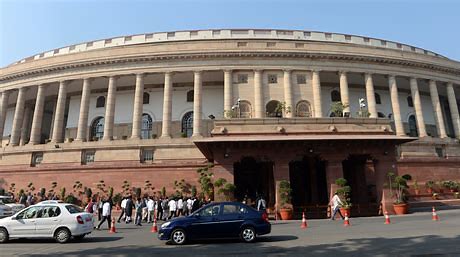In recent days, the Indian Parliament has been witness to intense debates and political clashes surrounding two crucial issues – the Delhi Services Bill and the Manipur ethnic conflict. These contentious topics have become the focal points of a political showdown between the ruling government and the united opposition. The Delhi Services Bill aims to control services and officers’ postings in Delhi, while the Manipur ethnic conflict demands the Prime Minister’s response. In this article, we will delve into the details of these significant events and their implications for India’s parliamentary democracy.
The Delhi Services Bill: A Rallying Point for the Opposition
The Delhi Services Bill, officially known as the Government of National Capital Territory of Delhi (Amendment) Bill, has become a center of controversy. The bill aims to replace an ordinance and create an authority for transfers and postings of senior officers in the Delhi government. The ruling Bharatiya Janata Party (BJP)-led National Democratic Alliance (NDA) has introduced the bill in Parliament, setting the stage for a face-off with the united opposition.
The opposition, comprising various parties such as the Indian National Congress and the Aam Aadmi Party (AAP), has vehemently opposed the bill. The AAP, led by Delhi Chief Minister Arvind Kejriwal, has emerged as one of the most vocal opponents. AAP, part of the opposition coalition INDIA, perceives the bill as an attack on Delhi’s autonomy and an attempt to curtail the powers of non-BJP governments in the capital.
AAP Rajya Sabha MP Raghav Chadha labeled the bill as “the most undemocratic, illegal legislative exercise in the history of India’s parliamentary democracy.” He expressed concern that it sends a message to the people of Delhi that their choice of a non-BJP government will be hindered, as the center seeks to wield more power over the city. Moreover, Chadha accused the BJP of overturning the Supreme Court’s judgment in a short span, undermining the court’s authority.
The bill’s introduction has prompted the opposition to rally together against the NDA government, creating a tense political climate within Parliament. The opposition’s resolve to stand united against the bill has intensified as they see it as an encroachment on the federal structure of governance.
The Manipur Ethnic Conflict: Demands for Prime Minister’s Response
Simultaneously, the Manipur ethnic conflict has cast its shadow over parliamentary proceedings. The opposition has demanded Prime Minister Narendra Modi’s participation in discussing the issue in Parliament. The conflict in Manipur has been a cause for concern, leading to demands for the government to take immediate action.
Home Minister Amit Shah, representing the government, expressed readiness to respond to the discussion on the Manipur matter in Parliament. However, the opposition rejected this offer and decided to move a no-confidence motion against the government as a last-ditch effort to compel PM Modi to address the situation in Manipur.
The opposition’s disappointment lies in the government’s insistence on proceeding with its legislative agenda even as the no-confidence motion was admitted by the Lok Sabha Speaker. This has led to accusations of disregard for the concerns raised by the opposition, further escalating tensions within Parliament.
Members of the newly formed opposition coalition INDIA, including representatives from AAP, visited Manipur to assess the situation firsthand. Their visit is expected to furnish additional ammunition for attacking the Modi government during parliamentary sessions.
The Political Showdown: Implications and Challenges
The ongoing standoff between the government and the opposition over the Delhi Services Bill and the Manipur ethnic conflict carries significant implications for India’s parliamentary democracy. The clash reflects broader challenges facing the country’s governance and political system.
1. Central vs. State Autonomy:
The Delhi Services Bill raises questions about the extent of autonomy granted to states and union territories. The opposition views it as an attempt by the central government to interfere in the affairs of Delhi’s state government, setting a precedent for similar interventions in other non-BJP governed regions.
2. Strengthening the Opposition:
The Delhi Services Bill has served as a unifying force for the opposition, fostering a united front against the government’s legislative agenda. It demonstrates the opposition’s determination to assert their position and challenge the government’s policies.
3.Federalism and Power Balance:
The conflict over the Manipur issue highlights the balance of power between the central government and state administrations. The opposition’s demand for the Prime Minister’s response emphasizes the importance of coordination and cooperation between the center and states on sensitive matters.
4. Public Perception and Mandate:
The political showdowns in Parliament raise questions about public perception and the government’s mandate. As elected representatives engage in heated debates, public sentiment becomes a crucial factor in shaping the direction of governance.
5. Challenges to Parliamentary Proceedings:
The confrontations between the government and the opposition have disrupted the regular functioning of Parliament. This can hinder the timely passage of legislation and impede crucial decision-making processes.
The Delhi Services Bill and the Manipur ethnic conflict have triggered a political storm in the Indian Parliament, with the ruling government and the united opposition locking horns on critical issues. The clashes reflect underlying challenges in maintaining a balance between central and state powers and upholding the principles of federalism.
As the opposition continues to assert its stance against the government’s policies, India’s parliamentary democracy faces crucial tests of strength and resilience. The ongoing political showdowns not only impact legislative matters but also shape public perception and the overall functioning of governance in the country.
Moving forward, constructive dialogue, respect for democratic norms, and a willingness to address concerns on both sides are essential to finding common ground and ensuring the smooth functioning of India’s parliamentary system. Only through meaningful engagement and cooperation can the nation effectively address the pressing challenges it faces and work towards a stronger, more inclusive democracy.












